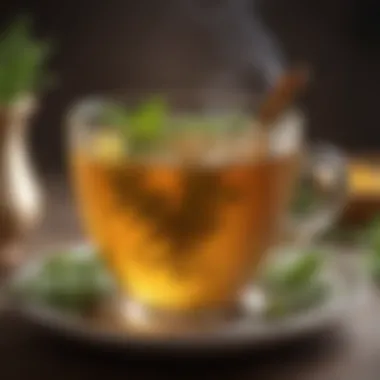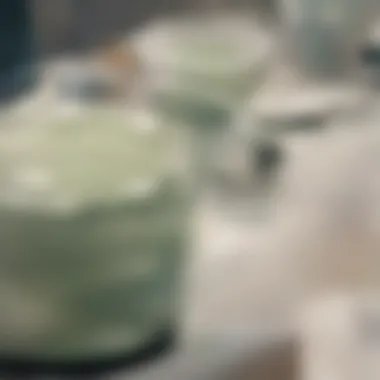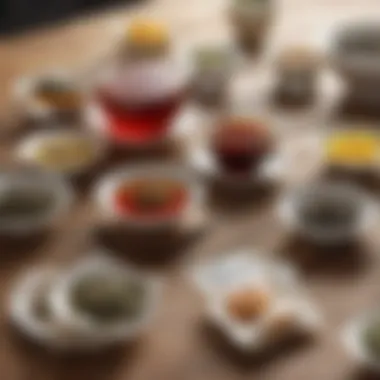Discover the Best Teas for Alleviating Cold Sores


Intro
Cold sores, caused by the herpes simplex virus, can be quite uncomfortable and often come at the most inconvenient times. Although there are many pharmaceutical solutions available, many individuals prefer exploring natural remedies. Among these, tea has emerged as a promising option due to its various active compounds and potential health benefits.
In this guide, we will examine different types of tea known for their healing properties against cold sores. This includes traditional herbal teas and modern blends that have gained attention for their antiviral effects. We will also provide insight on how these teas can be practically included in your routine, not just for managing cold sores but also for enhancing overall well-being.
Recipe Overview
While there isn't a specific recipe for tea as a single dish, brewing tea effectively can maximize its benefits. Here are the essential components to consider.
Brief Description of the Dish
The focus here is on preparing various teas that can potentially assist in managing cold sores. Each tea has its unique set of properties, offering different benefits. By regularly consuming these teas, you may improve your body's response to the herpes simplex virus.
Ingredients List
- Green tea
- Peppermint tea
- Licorice root
- Elderflower
- Honey (to taste)
- Lemon (optional)
Step-by-Step Brewing Instructions
Proper brewing methods can significantly enhance the health benefits of your tea. Here’s how to prepare each of these teas:
1. Green Tea
- Boil water until it reaches about 175°F (80°C).
- Add a green tea bag or 1-2 teaspoons of loose green tea leaves to your cup.
- Steep for 2-3 minutes, then remove the bag or strain the leaves.
- Add honey for sweetness if desired.
Tip: Drinking green tea regularly may help with virus suppression due to its high antioxidant content.
2. Peppermint Tea
- Boil water to about 200°F (93°C).
- Place fresh or dried peppermint leaves in your cup.
- Pour hot water over the leaves and steep for 5-10 minutes.
- Strain the leaves and add honey or lemon if you prefer.
Tip: The menthol in peppermint can provide soothing effects and help with discomfort.
3. Licorice Root Tea
- Boil water and let it cool slightly (around 200°F / 93°C).
- Add 1-2 teaspoons of dried licorice root to the water.
- Steep for 5-10 minutes and strain before serving.
Tip: Licorice root has antiviral properties, making it a valuable addition to your tea collection.
4. Elderflower Tea
- Boil water to about 200°F (93°C).
- Mix 1-2 teaspoons of dried elderflowers into your cup.
- Steep for 5-10 minutes and serve with honey if desired.
Tip: Elderflower may assist in reducing the severity and duration of cold sore outbreaks.
Culmination
Incorporating these teas into your daily routine can potentially bolster your immune system and help manage cold sore symptoms. Each tea brings unique properties that may aid in your recovery and overall health. Remember to explore these options mindfully and consult with a healthcare provider if needed, especially if using other medications.
"Natural remedies can offer supportive care for conditions like cold sores, allowing individuals to take an active role in their health management."
By understanding the benefits and proper preparation methods for these teas, you position yourself to leverage their advantages effectively.
Intro to Cold Sores
Cold sores, caused primarily by the herpes simplex virus type 1 (HSV-1), are both a physical and emotional burden for many individuals. Understanding cold sores is crucial, as they are not merely a cosmetic issue but can signify an underlying viral infection that requires management. In this article, we will explore the characteristics of cold sores, their causes, symptoms, and the treatments available. For those seeking effective management strategies, integrating specific types of tea into one's routine could offer substantial benefits.
Definition and Causes
A cold sore is a small, fluid-filled blister that typically appears on or around the lips. This viral infection manifests primarily after the herpes simplex virus enters the body, often during childhood. Stress, illness, hormonal changes, and sun exposure are among the factors that can trigger an outbreak. Once the virus enters the body, it remains dormant in the nerve cells and can reactivate due to several stimuli. Therefore, understanding these triggers is vital for prevention and management.
Symptoms and Duration


Cold sores usually appear as small blisters, which can be painful or itchy. The process often begins with a tingling sensation followed by redness and swelling. After a few days, these blisters break open and form crusts, typically healing within one to two weeks. The recurrent nature of outbreaks can vary widely among individuals. While some may experience multiple outbreaks in a year, others might have fewer episodes. Notably, the duration and severity of symptoms can also be influenced by the individual's immune response.
Common Treatments
Managing cold sores often involves a combination of self-care measures and medical treatments. Over-the-counter topical creams containing docosanol or acyclovir are frequently recommended to reduce symptoms. Antiviral medications, prescribed when outbreaks are frequent or severe, can accelerate healing and reduce symptoms. Additionally, natural remedies, such as herbal teas, may offer an adjunctive approach in managing symptoms. The emerging interest in natural treatments offers new possibilities for those looking to minimize the frequency and impact of cold sore outbreaks.
The Role of Herbal Tea
Herbal tea holds a significant position in the holistic management of health issues, including cold sores. The use of these teas is not merely a pleasant ritual but serves as a bridge between traditional knowledge and modern science. Many individuals turn to herbal remedies as a complementary approach to conventional treatments for cold sores caused by the herpes simplex virus. The key benefits lie in their potential antiviral, anti-inflammatory, and soothing properties. Understanding the role of herbal tea in this context can empower individuals to make informed choices in their quest for relief from cold sores.
Historical Use of Herbal Remedies
The historical reliance on herbal remedies spans across cultures and centuries. Ancient civilizations, including the Egyptians, Greeks, and Chinese, recognized the healing properties of various plants. Herbal tea was often consumed not just for enjoyment, but primarily for its health benefits. Herbs like chamomile and peppermint were used traditionally to alleviate symptoms of various ailments, including skin issues.
In many indigenous cultures, herbal teas played a crucial role in medical practices. For instance, the use of Echinacea tea originated from Native American tribes who believed in its capacity to strengthen the immune system. These historical practices emphasize a long-standing belief in the efficacy of herbal remedies.
Active Compounds in Herbal Teas
Herbal teas are rich in active compounds that can contribute to health benefits. For cold sores, certain components found in these teas can be particularly helpful. For example:
- Polyphenols: Found in green tea, these antioxidants can help fight inflammation. They also possess antiviral properties that may support the body's fight against the herpes virus.
- Menthol: Present in peppermint tea, menthol has soothing properties that can relieve discomfort associated with cold sores.
- Glycyrrhizin: This compound in licorice root tea exhibits antiviral and anti-inflammatory effects, which could be useful for managing cold sores.
- Rosmarinic acid: Found in lemon balm tea, this compound has shown promise in inhibiting viral replication, specifically targeting the HSV-1 virus.
By utilizing herbal teas with these beneficial compounds, individuals may enhance their overall health and potentially lessen the severity and frequency of cold sore outbreaks. Understanding these active ingredients paves the way for informed selections when considering herbal options for managing cold sores.
Types of Tea Beneficial for Cold Sores
The usage of specific teas for alleviating the symptoms of cold sores is backed by both historical and scientific perspectives. Each type of tea comes with unique properties that may contribute to the management of these viral outbreaks. Understanding these teas is important for those searching for natural remedies. The following sections explore various teas known for their effectiveness against cold sores, detailing their benefits, active compounds, and preparation methods.
Green Tea
Polyphenols and Antioxidants
Green tea is acclaimed for its rich content of polyphenols, particularly epigallocatechin gallate (EGCG). This compound exhibits antiviral health benefits that are relevant for cold sore management. Research shows that EGCG can inhibit the replication of the herpes simplex virus, which is the primary cause of cold sores. By reducing virus activity, green tea emerges as a beneficial choice for those afflicted by this condition.
The high concentration of antioxidants in green tea aids the immune system, providing additional support. These antioxidants help to protect cells from damage. While the consumption of green tea is widespread, ensuring the right brewing time and temperature can maximize the benefits, making it a popular option for health-conscious individuals.
Brewing Tips
Brewing green tea properly is essential to unlock its health benefits. The ideal water temperature is around 175°F to 185°F (80°C to 85°C). Steeping time should not exceed three minutes, as longer steeping can yield a bitter taste. This method preserves the delicate flavors and ensures that the polyphenols remain intact.
Moreover, buying high-quality loose leaf green tea can enhance the experience. It often possesses a higher concentration of beneficial compounds compared to tea bags. Thus, thoughtful preparation allows you to extract the most benefits from this tea while enjoying a rich taste.
Peppermint Tea
Menthol Effects
Peppermint tea is well-known for its menthol content. This component has notable soothing properties that can alleviate discomfort associated with cold sores. Menthol acts as a natural analgesic and contributes to cooling sensations, which can provide immediate relief during flare-ups. The relaxing aroma also serves to mitigate stress, which is important, as stress can trigger outbreaks.
In combination with its soothing qualities, peppermint has antiviral properties that may benefit those suffering from herpes simplex. This dual action makes peppermint tea not just a comfort beverage, but also a potentially effective remedy for cold sores.
How to Prepare
Preparing peppermint tea involves simple steps. Begin with fresh peppermint leaves or high-quality tea bags. Boil water and pour it over the leaves or bags. Steep for about five to ten minutes, depending on your flavor preference. For enhanced effects, consider adding honey, which has its own therapeutic properties. This tea can be consumed hot or cold and is a flexible addition to your daily routine.
Chamomile Tea
Anti-inflammatory Properties
Chamomile tea is celebrated for its anti-inflammatory effects. This makes it a valuable option for those experiencing the redness and irritation often associated with cold sores. The compounds in chamomile can help reduce swelling and promote healing, thus providing relief.
In addition, chamomile has sedative properties that improve sleep quality. Good rest is crucial for recovery when dealing with viral infections, emphasizing the tea's dual benefits. Incorporating chamomile into one's routine can thus promote both physical healing and general well-being.
Usage Recommendations
For optimal results, chamomile tea should be consumed 2-3 times a day during outbreaks. It can also be applied topically as a cooled compress for direct relief on the cold sore. Considering the anti-inflammatory benefits, chamomile serves as a gentle yet effective option for managing symptoms.


Licorice Root Tea
Properties of Glycyrrhizin
Licorice root tea is rich in glycyrrhizin, a compound with potent antiviral properties. This makes it an interesting choice for addressing cold sores, as glycyrrhizin can inhibit the growth of the herpes virus. By impeding viral replication, licorice root tea can provide a beneficial effect on managing outbreaks.
Licorice is also lauded for its ability to support the immune system. This dual benefit underscores its value in a dietary routine aimed at controlling cold sore symptoms. However, potential side effects exist, and moderation is key when consuming this tea.
Brewing Considerations
Licorice root tea requires special attention during brewing. It is typically recommended to use dried licorice root, and the usual steeping time is about 10 minutes. This allows for a full extraction of the beneficial compounds. Its naturally sweet flavor may reduce the need for added sweeteners, making it an enjoyable choice without additional calories.
Lemon Balm Tea
Effectiveness on HSV-1
Lemon balm tea has gained traction for its potential effectiveness against the herpes simplex virus type 1 (HSV-1). Preliminary studies suggest that lemon balm can inhibit viral growth, making it a strong candidate for cold sore treatment. Its calming nature also helps alleviate stress, which is a contributor to flare-ups.
For those interested in natural remedies, lemon balm presents a compelling option. The combination of its antiviral properties makes it suitable for daily use, potentially reducing the frequency of outbreaks over time.
Preparation Methods
Preparing lemon balm tea is straightforward. Use fresh or dried leaves and steep them in hot water for about 5 to 10 minutes. The flavor is mild, making it easy to incorporate into a daily routine. Adding ingredients like honey or ginger can enhance taste and therapeutic benefits.
Echinacea Tea
Immune Support
Echinacea tea is renowned for its immune support. This attribute is particularly valuable for individuals with cold sores, as a robust immune response can help prevent further outbreaks. Echinacea has compounds that play a role in stimulating the immune system, contributing positively to overall health.
In addition, the anti-inflammatory properties of echinacea can alleviate symptoms during an active outbreak. By reducing discomfort and bolstering immune defenses, echinacea tea becomes a significant player in managing cold sore conditions effectively.
Brewing Guidelines
Brewing echinacea tea is simple but requires attention to detail. Use one teaspoon of dried echinacea flowers per cup of water and steep for ten minutes. This ensures that the beneficial properties are adequately extracted. To enhance the flavor and benefits, consider combining echinacea with other herbal teas.
How to Incorporate Tea into Daily Routine
Incorporating tea into a daily routine can have subtle yet significant effects on managing cold sores. This practice not only aligns with natural healing approaches but also enhances overall wellness. Regular tea consumption can potentially soothe symptoms associated with cold sores, thanks to the unique compounds found in various types of tea. These compounds may help support the immune system and reduce inflammation.
When adding tea to your daily life, it is essential to pay attention to the timing and quantity. Specific teas can be more effective at different times of the day. For instance, starting the morning with a cup of green tea can invigorate your system, while chamomile tea before bed may promote relaxation.
Optimal Dosage
Finding the right dosage is crucial. Generally, consuming two to three cups of herbal tea per day is recommended. Green tea, for instance, may deliver optimal benefits at this level due to its high antioxidant content. However, some people may be sensitive to caffeine found in certain teas, thus opting for caffeine-free options like peppermint or chamomile in the evening is a good idea.
While steeping time is also a factor, most herbal teas can be steeped for about 5 to 7 minutes. This allows the flavors and active compounds to infuse into the water effectively. Remember that drinking excessive amounts may lead to discomfort or adverse effects; thus, moderation is key.
Tea Pairings and Recipes
Pairing your tea with complementary ingredients can enhance its effectiveness and enjoyment. Here are a few combinations:
- Green Tea with Honey: The natural sweetness of honey not only improves flavor but also has its own soothing qualities.
- Peppermint Tea with Lemon: Adding lemon gives Vitamin C, which has immune-boosting properties.
- Chamomile Tea with Lavender: This combination aids relaxation and can reduce stress, which may trigger cold sore outbreaks.
For a simple recipe, try a Cold Sore Relief Tonic:
- Brew Echinacea Tea for 5 minutes.
- Add a teaspoon of honey.
- Squeeze half a lemon into the mix.
- Stir well and enjoy.
This tonic combines immune support from Echinacea with antioxidants from both honey and lemon, making it highly beneficial.
"Tea is a quiet drink, allowing for moments of reflection and peace while nourishing your body."
Incorporating tea thoughtfully into your daily routine offers both enjoyment and health benefits. With the right dosages and thoughtful pairings, tea can play a supportive role in managing cold sores and overall wellness.


Scientific Studies on Tea and Cold Sores
The intersection of tea consumption and the management of cold sores is a topic that merits closer inspection. Cold sores, primarily caused by the herpes simplex virus type 1 (HSV-1), can result in significant discomfort and emotional distress. Therefore, understanding how certain types of tea may alleviate symptoms or speed healing is essential.
Scientific studies can provide evidence about the health benefits of teas such as green, peppermint, or chamomile. Through rigorous research, one can ascertain the chemical compounds in these teas that may offer antiviral properties. Learning about these findings is crucial for individuals who prefer natural, non-pharmaceutical approaches to managing their cold sore outbreaks.
Additionally, it is important to note the existing conclusions drawn from empirical research and how these findings can influence daily tea consumption for health benefits. It demonstrates the viability of integrating scientific understanding with herbal practices in everyday routines.
Relevant Research Findings
Research highlights several important compounds in tea known for their potential antiviral activities. Here are some notable findings:
- Green Tea Catechins: Studies show that catechins, particularly epigallocatechin gallate (EGCG), can inhibit HSV-1 replication. This suggests that regular consumption of green tea may offer protective properties against cold sores.
- Chamomile Extracts: Research indicates that chamomile has anti-inflammatory and antioxidant effects, which could minimize the discomfort associated with cold sores.
- Peppermint Oil: Some studies suggest that menthol, the active compound in peppermint, possesses certain antiviral properties that may aid in recovery from cold sore outbreaks.
These findings offer encouragement for further exploration of herbal solutions in the management of HSV-1, but they also highlight the need for more targeted studies in this area.
"Scientific studies serve as a bridge to connect traditional herbal practices with modern health insights."
Gaps in Research
Despite the promising results, there are still notable gaps in the research concerning tea's effectiveness in managing cold sores. Key areas requiring further investigation include:
- Lack of Longitudinal Studies: Many studies focus on short-term benefits, leaving a gap in understanding the long-term effects of regular tea consumption on cold sore recurrence.
- Limited Human Trials: A significant portion of the research is based on in vitro studies rather than clinical trials on human subjects. This limits the generalizability of findings.
- Dosage Recommendations: It remains unclear how much tea needs to be consumed to attain a therapeutic effect. Establishing clear dosage guidelines through future research is essential.
Potential Risks and Considerations
When exploring the benefits of tea for cold sores, it is essential to consider potential risks and any adverse effects that may arise. While herbal teas can provide therapeutic benefits, they are not without their downsides. Understanding these risks allows you to make informed choices that align with personal health needs and treatment goals.
Possible Side Effects
Although many find relief from cold sores by consuming specific herbal teas, certain side effects may be experienced. Common side effects can include:
- Digestive Upset: Some individuals may experience nausea or stomach discomfort. This can occur particularly with larger quantities.
- Allergic Reactions: Ingredients like chamomile or peppermint can cause allergic reactions in sensitive individuals. Symptoms could range from mild rashes to more severe respiratory issues.
- Effects of Caffeine: Teas that contain caffeine, such as green tea, can lead to insomnia or jitteriness if consumed in excess.
It is advisable to monitor your response to different teas and adjust intake accordingly. If any adverse reactions occur, consult a health professional.
Drug Interactions
Herbal teas may interact with medications, which is another crucial consideration. Possible interactions can include:
- Blood Thinners: Teas like chamomile may possess blood-thinning properties. Those on anticoagulant therapy should be cautious and discuss with their healthcare provider.
- Immune Suppressants: Echinacea, often found in tea form, could potentially stimulate the immune system and influence how immunosuppressant drugs function.
- Diabetes Medications: Some herbal teas may lower blood sugar levels, which could lead to complications if one is on medication for diabetes.
Before introducing new teas into your routine, especially if you are taking prescription drugs, consult with a healthcare professional. This is vital for safeguarding your health and ensuring effective cold sore management.
Always prioritize safety and awareness when experimenting with herbal remedies. They provide many benefits but also carry potential risks.
End
In closing, the exploration of tea as a potential remedy for cold sores underscores its relevance in both traditional and contemporary health discourses. The integration of these herbal infusions into daily practices offers several benefits. First and foremost, many teas, such as green tea and peppermint tea, are rich in compounds that can help mitigate the frequency and severity of outbreaks. This ability aligns with the growing interest in natural and holistic health approaches.
Furthermore, the article has highlighted the significance of understanding the specific properties of different teas. For instance, the polyphenols found in green tea may provide antioxidant support, while the menthol in peppermint tea may have soothing effects on discomfort associated with cold sores. Such information allows individuals to make informed choices about incorporating these beverages into their routines.
It is also essential to consider individual responses to these teas. As with any natural remedy, results may vary. Monitoring how your body reacts to these teas can guide further usage decisions. This variability is crucial when discussing treatment options and encourages a personalized approach to health.
"Herbal teas can be a gentle yet effective resource in managing cold sores, however, they should complement rather than replace prescribed treatments."
The importance of this topic extends beyond just a guide to specific teas. It encompasses a broader understanding of how lifestyle choices, such as dietary habits, can influence health outcomes. As cold sore management evolves, the incorporation of beverages like these, rich in beneficial compounds, can be part of a holistic strategy for better health.
Summary of Key Points
The significance of the key points discussed includes:
- Herbal Teas as Support: Teas can provide supportive relief during cold sore outbreaks.
- Active Compounds: Many teas contain compounds that may reduce inflammation and improve immune response.
- Lifestyle Integration: Incorporating teas as a daily routine can facilitate better management of cold sores.
- Personalization: Individual responses emphasize the need for tailored approaches in using these remedies.
Future Directions for Research
Research in this field should focus on several areas:
- Clinical Trials: Conducting rigorous clinical trials to establish the efficacy of specific teas in cold sore management.
- Mechanisms of Action: Investigating the mechanisms through which various tea compounds affect HSV-1 activity.
- Comparative Studies: Comparing the effectiveness of tea-based treatments against standard antiviral medications.
- User Experiences: Gathering subjective user experiences to understand practical outcomes better.
Further exploration into these aspects can enhance the current understanding of cold sores and lead to new, exciting therapies derived from herbal medicine.







